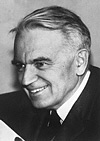 Gerhard Herzberg
– Biography
Gerhard Herzberg
– Biography Gerhard Herzberg
– Biography
Gerhard Herzberg
– BiographyGerhard Herzberg was born in Hamburg, Germany, on
25 December, 1904. He was married in 1929 to Luise Herzberg neé
Oettinger and has two children. He was widowed in 1971.
Herzberg received his early training in Hamburg and subsequently studied physics
at the Darmstadt Institute of Technology where in 1928 he obtained his Dr.Ing.
degree under H. Rau (a pupil of W. Wien). From 1928 to 1930 he carried out post-doctorate
work at the University of Göttingen under James Franck and Max Born and
the University of Bristol. In 1930 he was appointed Privatdozent (lecturer)
and senior assistant in the Physics Department of the Darmstadt Institute of
Technology.
In August 1935 Herzberg was forced to leave Germany as a refugee and took up
a guest professorship at the University of Saskatchewan (Saskatoon, Canada),
for which funds had been made available by the Carnegie Foundation. A few months
later he was appointed research professor of physics, a position he held until
1945. From 1945 to 1948 Herzberg was professor of spectroscopy at the Yerkes
Observatory of the University of Chicago. He returned to Canada in 1948 and
was made Principal Research Officer and shortly afterwards Director of the Division
of Physics at the National Research Council. In 1955, after the Division had
been divided into one in pure and one in applied physics, Herzberg remained
Director of the Division of Pure Physics, a position which he held until 1969
when he was appointed Distinguished Research Scientist in the recombined Division
of Physics.
Herzberg's main contributions are to the field of atomic and molecular spectroscopy.
He and his associates have determined the structures of a large number of diatomic
and polyatomic molecules, including the structures of many free radicals difficult
to determine in any other way (among others, those of free methyl and methylene).
Herzberg has also applied these spectroscopic studies to the identification
of certain molecules in planetary atmospheres, in comets, and in interstellar
space.
Herzberg has been active as President or Vice President of several international
commissions dealing with spectroscopy. He was also Vice President of the International
Union of Pure and Applied Physics from 1957 to 1963. He held the offices of
President of the Canadian Association of Physicists for the year 1956-57 and
President of the Royal Society of Canada for the year 1966-67.
Herzberg was elected a Fellow of the Royal Society of Canada in 1939 and of
the Royal Society of London in 1951. He was Bakerian Lecturer of the Royal Society
of London in 1960 and received a Royal Medal from the Society in 1971. He was
George Fischer Baker Non-Resident Lecturer in Chemistry at Cornell University
in 1968, and Faraday Medallist and Lecturer of the Chemical Society of London
in 1970. He is Honorary Member or Fellow of a number of scientific societies,
including the American Academy of Arts and Sciences, the Optical Society of
America and the Chemical Society. He is also a Foreign Associate of the National
Academy of Sciences in Washington and a member of the Pontifical Academy of
Sciences. He is a Companion of the Order of Canada. He has received many other
medals and awards and holds Honorary Degrees from a number of universities in
Canada and abroad, including one from the University of Stockholm.
From Les Prix Nobel en 1971, Editor Wilhelm Odelberg, [Nobel Foundation], Stockholm, 1972
This autobiography/biography was written at the time of the award and later published in the book series Les Prix Nobel/Nobel Lectures. The information is sometimes updated with an addendum submitted by the Laureate. To cite this document, always state the source as shown above.
Gerhard Herzberg died on March 3, 1999.